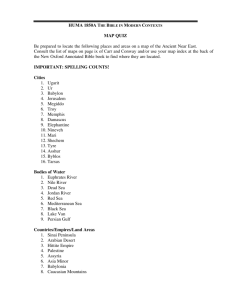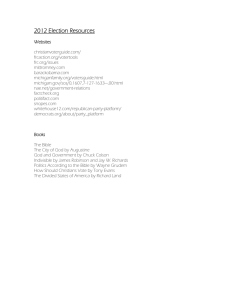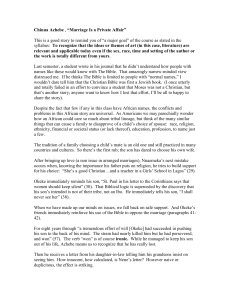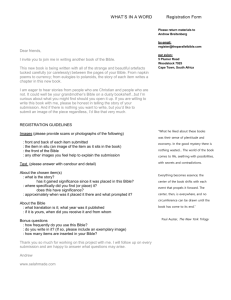BIB 502 - African-Americans and the Bible
advertisement
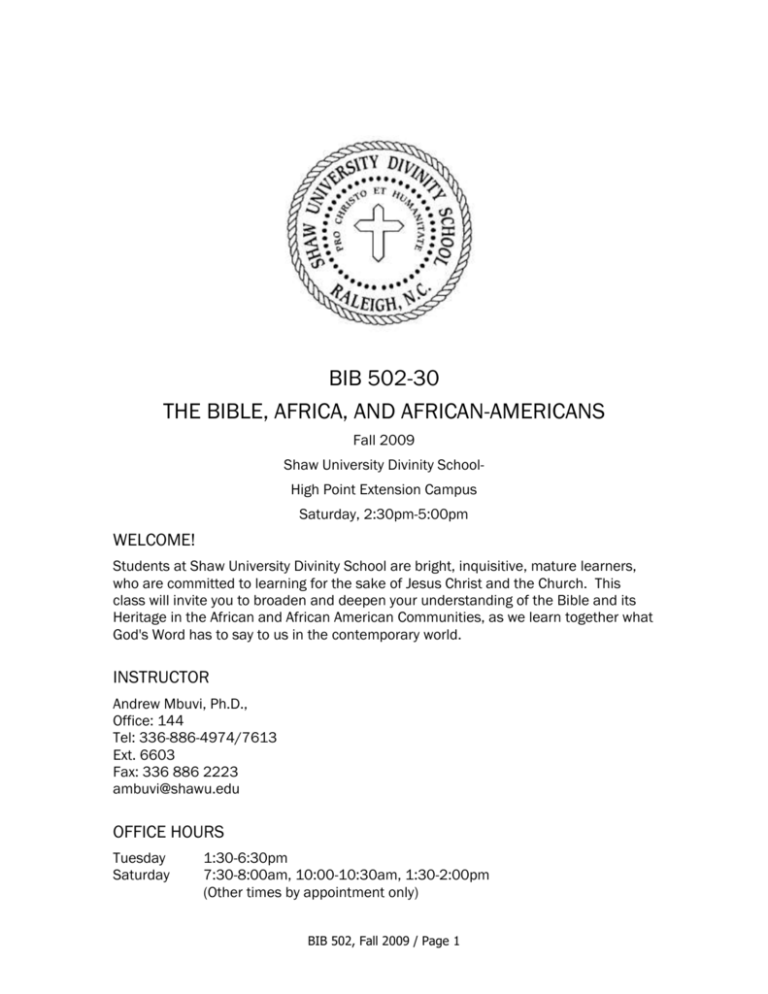
BIB 502-30 THE BIBLE, AFRICA, AND AFRICAN-AMERICANS Fall 2009 Shaw University Divinity SchoolHigh Point Extension Campus Saturday, 2:30pm-5:00pm WELCOME! Students at Shaw University Divinity School are bright, inquisitive, mature learners, who are committed to learning for the sake of Jesus Christ and the Church. This class will invite you to broaden and deepen your understanding of the Bible and its Heritage in the African and African American Communities, as we learn together what God's Word has to say to us in the contemporary world. INSTRUCTOR Andrew Mbuvi, Ph.D., Office: 144 Tel: 336-886-4974/7613 Ext. 6603 Fax: 336 886 2223 ambuvi@shawu.edu OFFICE HOURS Tuesday Saturday 1:30-6:30pm 7:30-8:00am, 10:00-10:30am, 1:30-2:00pm (Other times by appointment only) BIB 502, Fall 2009 / Page 1 DIVINITY SCHOOL MISSION STATEMENT Shaw University Divinity School provides Christian theological education dedicated to the preparation of clergy and laity for clinical, pastoral, and teaching/research ministry professions. The Divinity School is committed to the development of a research institute whose focus is leadership in the “practice of ministry’ in the African American community, particularly in the African American church. M.DIV MISSION STATEMENT The mission of the Master of Divinity degree is to prepare persons for ordained ministry, for chaplaincy, general pastoral and religious leadership responsibilities in congregations and other settings, and to prepare some students for admission to advanced programs oriented to theological research and teaching. The purpose is consistent with the mission of Shaw University Divinity School; the Master of Divinity program focuses on leadership in the “practice of ministry,” particularly in the African American church. MRE MISSION STATEMENT The mission of the Master of Religious Education degree is to equip persons for competent leadership in Christian Education to serve congregational ministries and other religious institutions. This purpose is consistent with the mission of Shaw University Divinity School; the Master of Religious Education program focuses on leadership in the “practice of ministry,” particularly in the African American Church. Program Goals MRE Program Goals MDiv Program Goals 1. to equip students with the capacity for critical and constructive theological reflection regarding the content and processes of educational ministry; 2. to help students understand the educational, social, and behavioral sciences that undergird educational practice, as well as the cultural contexts in which educational ministry occurs; 3. to assist students with personal growth and spiritual maturity; and 4. to provides skills in teaching and in design, administration, and assessment of educational programming. 1. to provide students with an intellectual atmosphere and a comprehensive, discriminating understanding of our religious heritage; 2. to enhance student training for Christian ministry, mindful of global, and diverse cross cultural, and non-American Christianities, and interaction with other faith traditions; 3. to support students' development in the personal and spiritual capacities necessary for pastoral and religious leadership, advancing growth in personal faith, emotional maturity, moral integrity, and public witness; 4. to expand programmatic activities, services, and academic programming to enhance student capacity for ministerial and public leadership. BIB 502, Fall 2009 / Page 2 Institutional Strategic Goals and Program Learning Outcomes Institutional Strategic Goals (ISG) Linkage to M.Div Linkage to MRE Program Learning Program Learning Outcomes Outcomes (PLO statement number(s) that correspond to or support the ISG) (PLO statement number(s) that correspond to or support the ISG) 2 Improving the intellectual atmosphere and academic performance of students 1, 2 1, 2 4 Enhancing current and new academic programs to ensure consistency in quality and scope. 2, 4 2, 4 1, 3, 4 1, 3, 4 8 Providing a rigorous and high quality graduate program through which students may attain advanced knowledge and skills to succeed in their chosen fields of specialization Course Description The focus of this course is learning the content of all the books of the Old Testament. Students will take regular quizzes on the content of the books. Students will also be introduced to the history of ancient Israel and some of the critical methods employed in studying the text. Program Leaning Outcomes and Related Student Learning Outcomes (SLO's) M.R.E. Degree PLO 1 - Heritage - Graduates will demonstrate a capacity to articulate an understanding of the scriptural, historical, and theological traditions of particular Christian traditions and of the broader community of faith. SLO 1.2 demonstrate an understanding of the history of the interpretation of the biblical text SLO 1.3 demonstrate an ability to interpret scripture in light of our Christian heritage BIB 502, Fall 2009 / Page 3 M.Div. Degree PLO 1 - Heritage - Graduates will demonstrate a capacity to articulate an understanding of the scriptural, historical, and theological traditions of particular Christian traditions and of the broader community of faith. SLO 1.2 demonstrate an understanding of the history of the interpretation of the biblical text SLO 1.3 demonstrate an ability to interpret scripture in light of our Christian heritage STUDENT LEARNING OUTCOMES At the completion of this course, students will be able to: SLO 1.2 demonstrate an understanding of the history of the interpretation of the biblical text SLO 1.3 demonstrate an ability to interpret scripture in light of our Christian heritage 4 Exposure to the history of the Bible in African American community and in Africa 5 Familiarity with the distinct aspects that African and African American Biblical scholars bring to the study of the Bible. 6 Roles that the Bible plays in the lives of the African Church and the African American Church 7 Exposure to works that focus on Assessment of Student Learning Outcomes (Assessment Tools) Reflection Papers Linkage to MDiv Program Learning Outcomes Linkage to MRE Program Learning Outcomes 1 1 Reflection Papers 1 1 Exam Questions, Reflection Papers 1 1 Exam Questions, Reflection Papers 1 Exam Questions, Reflection Papers 1 Exam Questions, 1 1 1 1 BIB 502, Fall 2009 / Page 4 interpretation of the Bible in African and African American communities 8 Articulate the significance of the perspectives of reading the Bible in the African and African American communities in reaction/relation to Eurocentric readings 9 identify the structure, themes, and major critical issues raised by African and African American readings of the Bible 10 demonstrate competence in understanding the African and African American Heritage in relation to the Bible Reflection Papers 1 1 1 1 1 1 Exam Questions, Reflection Paper Exam Questions, Reflection Papers Exam Questions/ Maps WEBSITE http://www.shawuniversity.edu This course will include an online component. Each student will be enrolled on the University’s Blackboard course site. The website is available as a link on the righthand side of the University’s website listed above. Students are expected to participate in all the online components of the course. You may access the website from the computer cluster in the Leonard building, any computer cluster on campus, or from any computer with Internet access. Required Texts Callahan, Allen Dwight. The Talking Book: African Americans and the Bible. New Haven: Yale University Press, 2006. BIB 502, Fall 2009 / Page 5 Andrew M. Mbuvi, “African Theology from the Perspective of Honor and Shame,” p. 279-295 in Conn, Harvie M. et al, The Urban Face of Mission: Ministering the Gospel in a Diverse and Changing World (New Jersey: P & R Publishing, 2002). Yamauchi, Edwin C. Africa and the Bible. Grand Rapids: Baker Books, 2004. Recommended Texts Wimbush. Vincent, ed. African Americans and the Bible. London: T & T Clark/ Continuum, 2001. Ukpong, Justin. Reading the Bible in the Global Village. Atlanta: Society of Biblical Literature, 2002. Please bring a Bible to class each week. It is not necessary to buy a Bible for this course. If you are going to buy a Bible, I would recommend that you purchase a study Bible in a recent translation. Among the best are the New Interpreter’s Bible Study Bible (New Revised Standard Version), HarperCollins Study Bible (NRSV), the New Oxford Annotated Bible (NRSV), the Zondervan NIV Study Bible (New International Version). COURSE DESCRIPTION This course will examine the role of Africa and Africans in the Bible and these respective communities’ interaction with the Bible going back to slavery and European Colonialism of Africa. We will also look at recent attempts to develop an African-American hermeneutic and read works by African-American biblical scholars and theologians. The course will be taught as a seminar, with student involvement and presentations constituting a major portion of the course work. SPECIFIC COMPETENCIES By the end of this course students should be able to: 1. describe at least two views of the place of Africa and Africans in the Bible, 2. describe the history of African-American biblical interpretation, 3. describe current issues in African and African-American interpretation, 4. give an oral, multimedia presentation on an issue raised in the class, and, 5. write a research paper on a significant issue in African and AfricanAmerican interpretation of the Bible. ATTENDANCE POLICY The University’s rule on absences will be observed in this course. During the semester, no student may have unexcused absences in excess of the number of times the course meets in a week (1). Excused absences will be granted only in BIB 502, Fall 2009 / Page 6 extraordinary circumstances. In order to get the most out of the course, students must keep excused absences to a minimum. It will be very difficult for a student to complete the course if he or she misses more than three class meetings. Please see the instructor before you miss a fourth class meeting. It is the responsibility of the student to turn in assignments on or before the due date if he or she must be absent on the due date. It is also the responsibility of the student to get class notes and any handouts from any missed class meeting. GRADING SCALE The following grading scale will be used for all assignments: A B C D F 90-100 80-89 70-79 60-69 below 60 I An incomplete is given only when extraordinary circumstances (extended illness, death in the family, etc.) prevent the student from completing all the assignments before the end of the semester. An incomplete must be made up before the end of the following semester, or the grade will automatically change to F, and the course must be repeated. Please note: Any student who receives an incomplete, regardless of the reason, will not be able to receive an A in the course. The highest grade possible for a student who receives an incomplete will be a B. All written assignments should conform to the guidelines in the Divinity School’s “Guidelines for Written Assignments,” available in the Divinity School Office. The following criteria will be used in evaluating all written assignments. A Indicates the student has significantly exceeded the minimum expectations for the assignment. The student has consulted the relevant scholars and has consistently entered into dialogue with these scholars, offering his/her critique of the relevant sources. All the required parts of the assignment are present, and the written presentation is consistently above average, with no errors in spelling or grammar. B Indicates the student has exceeded the minimum expectations for the assignment. The student has consulted relevant scholars and has entered into dialogue with most of them, offering his/her critique of the sources. All the required parts of the assignment are present, and the written presentation is above average, with no errors in spelling or grammar. C Indicates the student has met the minimum expectations for the assignment. The student has consulted relevant scholars and has represented their views well, at BIB 502, Fall 2009 / Page 7 least occasionally offering a critique of the sources. The required parts of the assignment are present, and the written presentation is acceptable, with minimal errors in spelling or grammar. D Indicates the student has not met the minimum expectations for the assignment in one or more of the following ways: significant critical scholarship is not consulted; significant segments of the assignment are missing or inadequate; or the written presentation is inadequate in grammar, spelling, or format. F Indicates the work is not acceptable for graduate-level study. GRADING BREAKDOWN Preparation, Attendance, Participation As a seminar, the success of this course depends entirely upon the students preparing for class each week, attending regularly, and participating fully in class discussions. Thus a reading report (1-2 Pages) for each week will be submitted online via “digital dropbox” in Blackboard. Weight: 25% total Class Presentations Each student will make TWO in-class presentations (20% each). These will be book reviews from the additional readings provided by the instructor (see Book Review Instructions below). The presentations must include, but is not limited to, the following: - a brief summary of the main point or thesis of the book - a description of how the book compares and contrasts with the views in the required texts - an assessment of how the book might relate to issues in the contemporary Church and world. . Date: Weight: to be determined in class 20% each (total 40%) Research Paper Each student will write a research paper of 12-15 pages on a topic related to this course. Topics must be cleared with the instructor prior to beginning work on the paper. Date: Dec 5 Weight: 35% BIB 502, Fall 2009 / Page 8 ASSIGNMENTS Due Dates All assignments are due on the dates indicated below. Any assignment submitted after the date noted below for any reason will not receive a grade of A. The highest grade possible for any assignment turned in after the due date will be B. Honor Pledge The University policy on plagiarism will apply to all assignments in this course. For this reason, all assignments will be submitted with the following honor pledge: I affirm that the contents of this assignment are my own writing. Nothing in this paper is copied from a textbook, copied from other books, downloaded from the internet, or copied from any other source. I understand that if I violate this affirmation, I will receive a failing grade on this assignment and possibly in the class. Signed________________________ The university policy on plagiarism further states that repeated violations may result in suspension from the university. CLASS SCHEDULE August 22 Introduction Read: Vincent Wimbush, African-Americans and the Bible, Chapter One Callaghan, The Talking book August 29 History of the Issue Prologue & Chap. 1 September 5 LABOR DAY WEEKEND -- NO CLASS History of the Issue Callahan, Ch.2 “Poison Book” September 12 History of the Issue BIB 502, Fall 2009 / Page 9 Callahan, Ch.3 – “Good Book” September 19 History of the Issue Callahan, Ch.4 - “Exile” September 26 History of the Issue Callahan, Ch.5 – “Exodus” October 3 History of the Issue Callahan, Ch. 7, “Emmanuel” October 10 Contemporary Issues First Book Review Due Read: Andrew Mbuvi, “Honor and Shame” October 17 NO CLASS – Homecoming!! Read: Yamauchi, Africa and the Bible, Ch.2 October 24 African Biblical Interpretation Read: “Reading The Bible in Africa” – Mwombeki October 31 African Biblical Hermeneutics Read: “African Biblical Interpretation” - Loba Mkole Second Book Review Due November 7 Yamauchi ch.3 - Widening the Dialogue November 14 Yamauchi ch.4 - Widening the Dialogue November 21 SBL Conference – NO CLASS November 28 HAPPY THANKSGIVING! December 5 BIB 502, Fall 2009 / Page 10 Final Paper Due Last Day of Class Bibliography Grant LeMarquand’s bibliography of the “Bible in Africa,” can be accessed at <http://www.tesm.edu/articles/lemarquand-bibliography-of-bible-in-africa.html> Book Review Instructions Purpose This assignment is an exercise in critical reading, a skill that all students should develop. The assignment has four parts, and must not exceed eight (8) pages. The following parts must be in the paper in the following order. 1. Identification (5 pts.) Identify the book through standard bibliographic format. 2. Contents (20 pts.) Briefly give a factual summary of the main points the author makes. 3. Thesis (10 pts.) State the author's thesis, that is, the main point the author wishes to convey. Note whether or not a thesis is explicitly stated or only implied. 4. Evaluation (65 pts. total) This is the most important part of the assignment and should constitute the bulk of the paper. BIB 502, Fall 2009 / Page 11 Does the author successfully demonstrate his/her point? (30 pts.) How effective is the author in proving the thesis of the book? Why is the author’s argument effective or ineffective? What about the author’s argument is persuasive or not persuasive and why? You should make specific references to the evidence the author employs. You should also note other ways of interpreting this evidence, in so far as you are able to determine this. What is the author’s attitude toward the subject? (15 pts.) By specific reference to the author's work, describe the author’s attitude to the subject matter. Does the author generally appear objective? Does she/he reveal a particular attitude towards the subject matter? How does this effect the way he/she evaluates the evidence? Are there others who agree or disagree? (10 pts.) Does the author mention other positions on the issue(s) he/she discusses? How does he/she evaluate these positions? Does he/she appear to be fair in these evaluations? Does the book contribute to your understanding of the subject? (10 pts.) You should include consideration of whether or not this book is worth reading. Does it contribute significantly to scholarly debate? Did it help you to understand the issue better, or only confuse you? Would you recommend this book to others interested in the topic? BIB 502, Fall 2009 / Page 12




